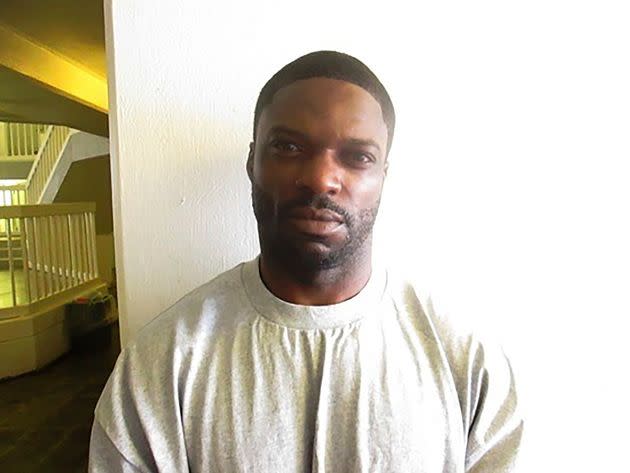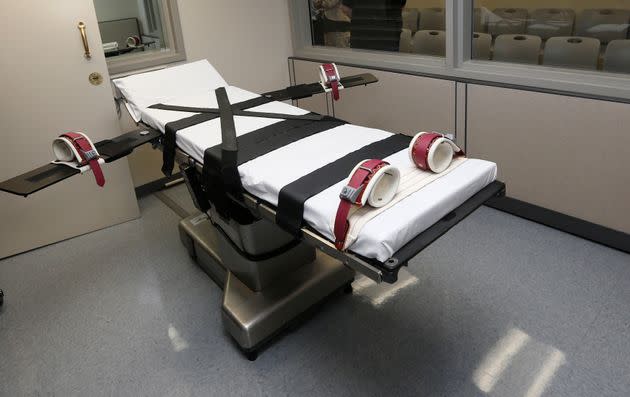Oklahoma Begins 2024 Executions With Death Of Michael Dewayne Smith
Oklahoma returned to its state-sanctioned killing spree with the execution Thursday of a 41-year-old Black man, Michael Dewayne Smith.
Smith’s execution comes after Oklahoma resumed the death penalty in 2021, which had been on pause for nearly six years, and arranged the execution dates for 25 people. Its last execution was four months ago, on Nov. 30.
The lethal injection of Smith, who had been on death row for about 20 years, highlights the concerns about the overlap of the death penalty with issues of Blackness, drug use and intellectual disability.
According to mediawitnesses, Smith was pronounced dead at about 10:20 a.m. Central time.
Smith declined to provide his last words in the execution chamber, but he told HuffPost on Tuesday that he was innocent and that inconsistencies with his confession were not adequately addressed.
At the time, Smith said he was “staying in good spirits — for the most part” and was “good, given the circumstances.”
Rev. Jeff Hood, his spiritual adviser, told HuffPost that Smith was tearful minutes before and during the execution process. Hood added that a tear fell from Smith’s right eye after he appeared to be dead.
“What happened today was unnecessary. Oklahoma is going to be no different this afternoon than it was this morning. No safer,” Hood said. “The only thing that it’s going to be is less ethical.”

Before Smith’s Death Sentence
Smith had been linked to three murders. He was sentenced to death for the February 2002 killings of Janet Moore, 40, and Sharath Pulluru, 22, and had been sentenced to life in prison for the November 2001 killing of Otis Payne, 26.
Smith initially gave a confession in the deaths of Moore and Pulluru, but he has since said that he is innocent and can’t remember committing the crimes.
At the time of his arrest, Smith said he killed Moore when he was looking to kill her son, Phillip Zachary, because she reacted loudly when he broke into their home, according to The Oklahoman.
Smith reportedly then went to a convenience store and shot Pulluru, a store clerk, nine times and lighted his body on fire, according to The Oklahoman.
But Smith was reportedly looking to kill a different store clerk, who had told a newspaper reporter about being proud of a co-worker who had killed a member of a gang Smith was associated with during a 2001 armed robbery. Another gang member killed the store clerk during the robbery.
An Oklahoma jury convicted Smith in 2003 of first-degree burglary, two counts of first-degree murder, robbery with firearms and arson in the first degree. The jury sentenced him to death for the murder convictions.
Since then, two of the trial witnesses have recanted parts of their testimony, saying that police officers and the trial judge coerced them, according to court documents.
Smith has claimed to have been under the influence of a hallucinogen known as PCP and said he does not remember committing the crimes, being arrested or confessing.
“I have no memory of my actual arrest or my interrogation,” Smith told HuffPost on Tuesday. “It took me a few weeks after I was in the county jail to actually ‘come to,’ so I don’t have any memory or any recollection.”
He argued that beyond his confession, there was not enough evidence to prove he committed the crimes.
Earlier this year, Smith’s attorneys filed a motion requesting DNA testing. The District Court of Oklahoma denied the motion, arguing that Smith “failed to demonstrate a reasonable probability that he would not have been convicted if DNA testing is conducted and yields favorable results.”
On March 6, Smith sought a clemency recommendation from the Oklahoma Pardon and Parole Board in an effort to spare his life.
“I didn’t commit these crimes. I didn’t kill these people,” Smith told the board in a tearful video call, according to The Associated Press. “I was high on drugs. I don’t even remember getting arrested.”
Amie Ely, first assistant attorney general of Oklahoma, argued at the hearing that Smith did kill the three people and that he should be executed, according to the nonprofit news outlet Frontier.
“Michael Dewayne Smith has taken multiple lives and has expressed the desire to kill others,” Ely said. “Even in a highly restricted area of the prison, Smith has managed to create weapons.”
One of Smith’s attorneys, Mark Henricksen, argued at the hearing that executing Smith would not be adequate justice, according to Frontier.
“Their relatives remain slain, and the only practical difference will be that the Smith family will join them in grief,” Henricksen said. “And the totality of the sufferings will increase tenfold.”
The board denied a clemency recommendation by a vote of 4-1.
A petition with thousands of signatures, organized by Death Penalty Action, was brought to Republican Gov. Kevin Stitt on Wednesday, demanding that he stop Smith’s execution.
On Thursday, Attorney General Gentner Drummond released a statement about Smith’s execution with quotes from the victims’ families.
“I pray that today brings some measure of peace for the families of Janet Miller-Moore and Sharath Pulluru. It has been a long and difficult 22 years for their loved ones, and my heart aches over the agony they have endured,” Drummond said.
After the execution, Moore’s family released a statement, saying, “The memory of her life, her work, and her deeds will continue to live on. Justice has been served.”
Pulluru’s family said also they felt that Smith’s death was an act of justice.
“Sharath was the life of our family. We are a very close family and his sudden death in such a violent manner has affected our families’ lives every day since. He will forever live in our hearts. We are thankful justice was served today,” the family said.
A Black Man With A ‘Painful Story’
Rev. Don Heath, chair of the Oklahoma Coalition to Abolish the Death Penalty, said that Smith deserves mercy, according to KOKH-TV in Oklahoma City.
“Michael Smith has a painful story: 10-year-old boy with borderline intellectual disability, loses his father, gets strung out habitually on PCP and joins a gang, with tragic results, when he is 19. We all stand in need of mercy, and Smith has gotten precious little,” Heath said.
Though a 2002 U.S. Supreme Court decision found that executing intellectually disabled people was unconstitutional, individuals who exhibit signs of having intellectual disabilities have continued to be executed, including Matthew Reeves, who was executed in Alabama in 2022, and Willie Pye, executed by Georgia last month.
One indicator of intellectual disability is having an IQ score below 70, according to the American Psychiatric Association.
Though Smith’s attorneys have argued he is intellectually disabled, his IQ results have landed from 71 to 79, according to The Report of the Oklahoma Death Penalty Review Commission.
Smith was among the 41% of Black people who make up the country’s death row population, despite Black people making up less than 14% of the U.S. population.
Moreover, Black people make up 7.9% of Oklahoma’s population, according to recent census data, but as of January 2023, 17 out of the 40 people on death row in Oklahoma (more than 42%) were Black, according to the Death Penalty Information Center.
Given that racial discrimination and biases are heavily presented in the criminal justice system, the fight to abolish the death penalty is frequently linked to racial justice.
“He [Smith] is a product of decades and decades, hundreds of years of injustice,” Hood told HuffPost. “How in the fuck could race not play a role in the sentencing of a Black man in Oklahoma City, Oklahoma?”
“When I saw Michael on that gurney, strapped down, I saw a Black man in America who had been strapped down by this society his entire life.”
Smith told HuffPost that he, too, believed that his race played a role in his sentence and compared his case to that of Richard Glossip, a white man on Oklahoma’s death row whose case has drawn nationwide attention.
“In Oklahoma, there’s a lot of racism here. It really shows between me and Richard Glossip’s case,” Smith told HuffPost. Glossip’s case will be heard by the U.S. Supreme Court this fall over concerns that he did not receive a fair trial in a 1997 murder case.
“Due to the fact that I’m Black, ain’t nobody even thinking about looking in depth into my case,” Smith added.
Smith’s attorneys declined HuffPost’s request for comment.

Oklahoma’s History Of Botched Executions
Despite a decrease in executions nationwide, Oklahoma began to ramp up executions after a moratorium of close to six years came to a close in 2021.
In 2022, the state set execution dates for 25 people, roughly half of the people who were on death row at the time — roughly one prisoner per month. There was a brief delay in the scheduled killings in 2023, when the state agreed to slow the executions, scheduling them at least60 days apart.
The Oklahoma Attorney General’s Office and Department of Corrections filed a motion in January to set the execution dates 90 days apart to prevent botched executions and lessen the burden on executioners. But Judge Gary Lumpkin of the Oklahoma Court of Criminal Appeals pushed against spreading out the executions further, telling executioners to “man up,” according to Frontier.
“We set a reasonable amount of time to start this out, and y’all keep pushing it and pushing it and pushing it,” Lumpkin told Oklahoma Attorney General Gentner Drummond at a court hearing late last month. “Who’s to say next month you won’t come in and say I need 120 days? This stuff needs to stop, and people need to suck it up, realize they have a hard job to do and get it done in a timely, proficient, professional way.”
In line with 27 other states, the federal government and the U.S. military, Oklahoma relies on a lethal injection protocol for its executions. Oklahoma was the first state to use the method, starting in 1977, and is notorious for some of the most infamous botched lethal injection — including those of Clayton Lockett in 2014 and Charles Warner in 2015.
The lethal injection protocol is a three-drug cocktail that has proved to be less reliable — and presumably more painful or time-consuming — than other execution methods, which include firing squad, electrocution and lethal gas.
Experts and advocates for abolishing the death penalty have argued that lethal injection is unconstitutional.
“It’s been likened to the sensation of waterboarding, suffocation, and exposure to chemical fire,” Robert Dunham, former director of the Death Penalty Information Center, previously told Business Insider. “That is not the peaceful passing that lethal injection had been advertised to be.”
Smith’s execution marks the first in Oklahoma in 2024 but the fourth in the U.S. this year — including Alabama’s lethal gas execution of Kenneth Smith, which HuffPost’s Jessica Schulberg reported on in January.
Related...
Judge Makes Highly Unusual Move In Execution Capital Of The U.S.
Supreme Court Will Hear Oklahoma Death Row Prisoner's Appeal
Activists Petition To Halt Execution Of Georgia Man Convicted Of Murder Nearly 30 Years Ago
Idaho's Longest-Serving Death Row Prisoner's Execution Is Delayed After Failed Attempt

